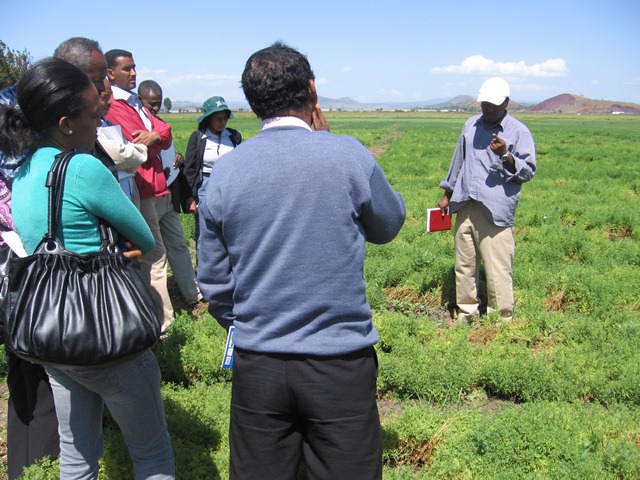2011, October: Efficacy evaluation of chemical pesticides

In October 2011, a second workshop was organized in Debre Zeit on efficacy evaluation of chemical pesticides as part of Work Package B2-1. Its activities followed on the first workshop held in January 2011 in Addis Ababa. In these two workshops, the participants have been discussing and working on the improvement of the evaluation system for efficacy of pesticides. High quality and uniform efficacy trials make it possible to perform proper and efficient evaluation of efficacy data. Training during both workshops was provided by Paul de Boer of Linge Agroconsultancy in The Netherlands. The first step undertaken was the improvement of the general guidelines to be followed at all efficacy testing of chemical pesticides. These have been adapted to meet international standards and to set the requirements for acceptable trial conduct and reporting of trial results. The contents have been amended, e.g., assessments of phytotoxic symptoms and other adverse effects are now ensured, the necessity of statistics is laid down and the use of a Table of Intended Use is introduced
Parallel to this, crop-pest specific efficacy testing protocols have been developed by the participants of the workshops from different Ethiopian institutes, notably EIAR. In these documents, the trial setup is described in detail for a particular crop-pest combination. A format is agreed on, which accounts for, e.g., the test organism, the experimental unit, type and timing of assessments etc. Within the workshops the 20 most important crop-pest combinations for Ethiopia have been elaborated.An important element included in the efficacy testing protocols is the possibility to extrapolate efficacy data. Using extrapolation the research can be carried out more efficiently. For example, if an insecticide has demonstrated to give adequate control of aphids on wheat, this product is also assumed to be effective in the control of aphids on triticale. Similarly, a fungicide which is effective for the control of late blight on tomato may give adequate control of the same disease on chilli pepper, sweet pepper and eggplant. In these cases no additional testing is needed beside the effectiveness trials in wheat and tomato. Extrapolations of effectiveness data should be done between crops and between pests, extrapolation of phytotoxicity data between crops only.
Upcoming activities within this work package will focus on the implementation of the general guidelines and efficacy testing protocols at the research institutes in Ethiopia. The construction of greenhouses is considered, which may facilitate efficacy trials on covered floriculture crops in the future. National experts will be involved in the development of extrapolation procedures for efficacy data. Also, extrapolations from (efficacy) data from other countries is going to be investigated.



